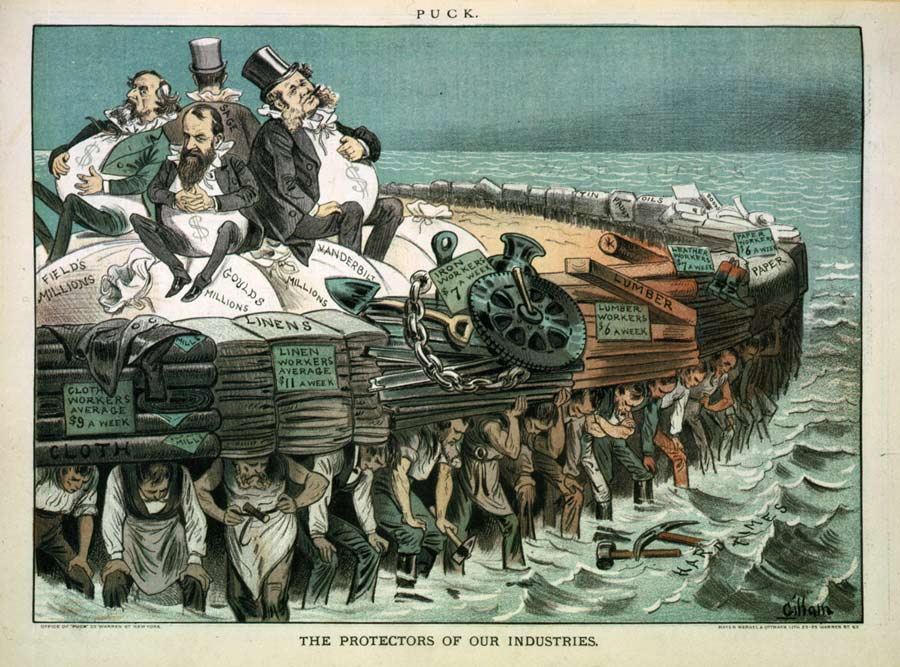The views expressed in our content reflect individual perspectives and do not represent the authoritative views of the Baha'i Faith.
During Abdu’l-Baha’s visit to Europe and North America in the early 1900s, the labor movement took the Western world by storm—sometimes a very violent storm.
The Baha’i teachings clearly describe the origins of labor strife between workers and management:
Now, the root cause of these difficulties lies in the law of nature that governs present-day civilization, for it results in a handful of people accumulating vast fortunes that far exceed their needs, while the greater number remain naked, destitute and helpless. This is at once contrary to justice, to humanity, and to fairness; it is the very height of iniquity and runs counter to the good-pleasure of the All-Merciful.
Historically—and interestingly—the modern labor and trade union movements developed during almost exactly the same timeframe as the emergence of the Baha’i Faith. These labor movements happened as an increasingly industrialized world impelled the growth of a large population of working-class people in the latter half of the nineteenth century. For example, the International Workingman’s Association, the first international labor union, came into being in 1864, a year after Baha’u’llah founded the Baha’i Faith in 1863.
Unions developed as a result of the Industrial Revolution, the harsh exploitation of employees by capitalist “Robber Barons” and the grim, often fatal conditions for the working class during that period. Because of those conditions, and because of the great disparity of wealth and poverty in multiple cultures, by the early 1900s labor and management had come to violent, polarized odds. Labor strikes spread all across Europe and the United States, and began to occur worldwide. Violence often accompanied such strikes, especially when factory and mine owners hired “strikebreakers,” armed enforcers who assaulted and killed striking workers.

In one famous series of incidents called the “Bread and Roses Strike” which immediately preceded Abdu’l-Baha’s arrival in North America, female textile workers in Lawrence, Massachusetts—many of them recent immigrants—united with the militant Industrial Workers of the World (IWW) Union and walked out of their jobs in manufacturing plants. Their slogan, “Bread and Roses,” symbolized their demands for better wages and working conditions:
Thirty-six of every 100 of all men and women who work in the mills die before or by the time they are 25 years of age. … While the mill hands lived and died in poverty, their employers thrived. – The Massachusetts Bureau of Labor Statistics, 1911.
During the Bread and Roses strike, several striking women were beaten by police while putting their children on a train for safekeeping; and in another incident police shot and killed a female striker, Anna LoPizzo, while she participated in a legal march. Those incidents shocked the world, and the pressure of public opinion forced the mill owners to finally settle the strike.
Arriving in North America a month later, Abdu’l-Baha spoke out extensively, at many of his stops across North America, about the burning issues of labor, management and justice. He made many specific recommendations for solving the injustices the Industrial Revolution had brought, including these four: profit-sharing, joint employee ownership, the passage of new laws to legislate labor fairness, and the elimination of business trusts:
Gracious God! How can one see one’s fellow men hungry, destitute and deprived, and yet live in peace and comfort in one’s splendid mansion?…
… the factory workers reap a fortune every day, but the wage the poor workers are paid cannot even meet their daily needs: This is most unfair, and assuredly no just man can accept it. Therefore, laws and regulations should be enacted which would grant the workers both a daily wage and a share in a fourth or fifth of the profits of the factory in accordance with its means, or which would have the workers equitably share in some other way in the profits with the owners.
In several places in his writings, Abdu’l-Baha went beyond simply advocating the adoption of profit-sharing to actual ownership-sharing:
Concerning the case of profit-sharing by the employers among the workers, which thou hadst written about, undoubtedly the workers must secure their daily salary, and in addition, must have shares with the employers so that they may engage with the utmost effort in that work. For example, a capitalist has a thousand employees, he must give them a moderate salary every day, that they may not remain hungry and naked, and also assign a definite share of the profit to the workers so that at the beginning of each year it may be distributed among them, that this may cause the workers to exert the utmost care and effort in their job. – Abdu’l-Baha, Star of the West, Volume 6, p. 335.
He also spoke out on the overriding issue of the trusts—large business conglomerates that prevented competition, maintained monopoly control of many industries and conspired to keep wages low. He advocated for anti-trust laws to protect the working class:
The owners of properties, mines and factories should share their incomes with their employees and give a fairly certain percentage of their products to their workingmen in order that the employees may receive, beside their wages, some of the general income of the factory so that the employee may strive with his soul in the work.
No more trusts will remain in the future. The question of the trusts will be wiped away entirely. Also, every factory that has ten thousand shares will give two thousand shares of these ten thousand to its employees and will write the shares in their names, so that they may have them, and the rest will belong to the capitalists. Then at the end of the month or year whatever they may earn after the expenses and wages are paid, according to the number of shares, should be divided among both. In reality, so far great injustice has befallen the common people. Laws must be made because it is impossible for the laborers to be satisfied with the present system. – Ibid., Volume 10, pp. 124-125.
These spiritual principles in the Baha’i teachings—fairness, equity, lawful solutions to social problems and the voluntary sharing of wealth—can make for a more united and prosperous community life for all.
















Comments
Sign in or create an account
Continue with Googleor